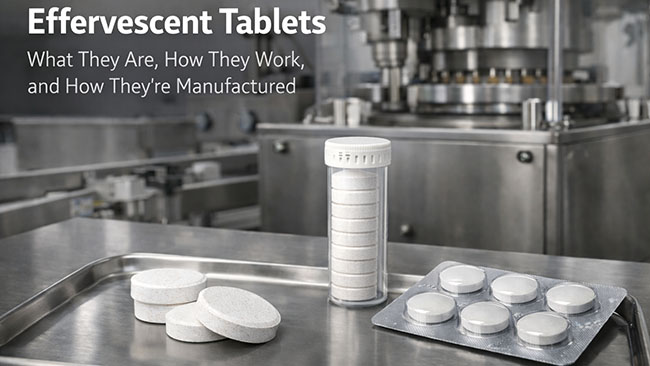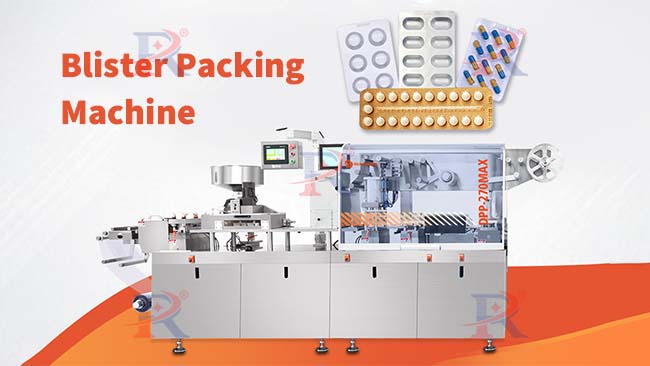การแนะนำ
ในโลกที่มีการควบคุมอย่างเข้มงวดของการผลิตยาและผลิตภัณฑ์เสริมอาหาร ความได้เปรียบในการแข่งขันขึ้นอยู่กับความมีประสิทธิภาพในการผลิต และเครื่องบรรจุแคปซูลได้กลายเป็นจุดศูนย์กลางของการแข่งขันนี้ไปแล้ว ขณะที่ความต้องการแคปซูลเพิ่มขึ้นอย่างต่อเนื่อง ซึ่งได้รับแรงหนุนจากเทรนด์ผลิตภัณฑ์เสริมอาหารระดับโลก การเพิ่มขึ้นของประชากรสูงอายุ และการแพทย์ที่ปรับให้เหมาะกับบุคคล ผู้ผลิตจำเป็นต้องหาวิธีเพิ่มปริมาณการผลิต ลดการพึ่งพาแรงงาน และรักษาคุณภาพให้คงที่.
เข้าสู่เครื่องบรรจุแคปซูล: รากฐานของการผลิตแคปซูลสมัยใหม่ การบรรจุแคปซูลที่เคยเป็นงานที่ต้องทำด้วยมือและใช้เวลามาก ได้พัฒนาเป็นกระบวนการที่ขับเคลื่อนด้วยความแม่นยำและอัตโนมัติสูง ตั้งแต่ระบบจ่ายยาขั้นสูงไปจนถึงการออกแบบที่ได้รับการรับรองมาตรฐาน GMP ในปัจจุบัน เครื่องบรรจุแคปซูลอัตโนมัติ มอบระดับของความสม่ำเสมอและประสิทธิภาพที่ระบบการทำงานด้วยมือไม่สามารถเทียบได้.
บทความนี้สำรวจว่าเครื่องบรรจุแคปซูลอัตโนมัติช่วยเพิ่มประสิทธิภาพในทุกขั้นตอนของการผลิตอย่างไร ตั้งแต่การตวงปริมาณ การจัดการวัสดุ ไปจนถึงการบำรุงรักษาและการบูรณาการกับสายการผลิตอัจฉริยะ.
1. เครื่องบรรจุแคปซูล ระบบอัตโนมัติตั้งแต่การให้อาหารจนถึงการล็อก
ระบบอัตโนมัติเป็นปัจจัยที่มองเห็นได้ชัดเจนที่สุดและก่อให้เกิดการเปลี่ยนแปลงมากที่สุดต่อประสิทธิภาพการผลิต ในรุ่นเครื่องบรรจุแคปซูลแบบกึ่งอัตโนมัติรุ่นเก่า การป้อนแคปซูล การจัดวาง การแยก และการล็อคแคปซูลต้องอาศัยการแทรกแซงจากมนุษย์ ด้วยระบบ เครื่องผลิตแคปซูลยาอัตโนมัติ, ขั้นตอนทั้งหมดนี้เกิดขึ้นอย่างราบรื่นผ่านการประสานงานที่สอดคล้องกัน.
สายการผลิตแคปซูลเริ่มต้นด้วยการป้อนและจัดเรียงแคปซูลเปล่า เครื่องจะแยกฝาแคปซูลออกจากตัวแคปซูลโดยใช้เทคโนโลยีสุญญากาศ จากนั้นบรรจุผงหรือเม็ดยาลงไปอย่างแม่นยำ ปิดผนึก และปล่อยแคปซูลออกมา ทั้งหมดนี้เกิดขึ้นภายในไม่กี่วินาที.
เครื่องบรรจุอัตโนมัติเต็มรูปแบบ เช่น NJP-1500D ของ Ruidapacking สามารถบรรลุ สูงสุดถึง 90,000 แคปซูลต่อชั่วโมง, แทนที่ผู้ปฏิบัติงานด้วยมือสี่คน. ไม่เพียงแต่เพิ่มความเร็วเท่านั้น แต่ยังรับประกันความสม่ำเสมอ—แต่ละแคปซูลได้รับปริมาณและแรงกดล็อกเท่ากัน.
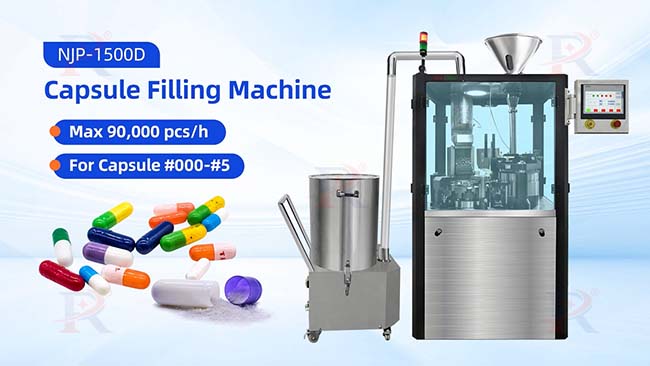
ระบบอัตโนมัติครอบคลุมถึงการควบคุมแบบดิจิทัล ระบบที่ใช้ PLC เป็นฐานควบคุมมอเตอร์และวาล์วทุกตัว ขณะที่หน้าจอสัมผัส HMI แสดงข้อมูลแบบเรียลไทม์ เช่น ความคืบหน้าของแบตช์ อัตราการปฏิเสธ และสถานะการทำงาน หากเกิดข้อผิดพลาด เครื่องจะหยุดทำงานโดยอัตโนมัติ แจ้งเตือนผู้ควบคุม และแนะนำการแก้ไข.
ผลลัพธ์ด้านประสิทธิภาพ: การเคลื่อนไหวที่ต่อเนื่องและสอดคล้องกันช่วยลดเวลาที่เครื่องจักรหยุดทำงานระหว่างการปฏิบัติงาน และลดการมีส่วนร่วมของมนุษย์ได้ถึง 70% ซึ่งช่วยปรับปรุงทั้งความเร็วและความน่าเชื่อถือ.
2. ระบบการวัดปริมาณที่แม่นยำช่วยลดการสูญเสียผลิตภัณฑ์
ในการผลิตแคปซูล ความแม่นยำเท่ากับความสามารถในการทำกำไร ทุกกรัมของผงที่ประหยัดได้หมายถึงการลดต้นทุนและเพิ่มผลผลิต เครื่องบรรจุแคปซูลสมัยใหม่ผสานระบบจ่ายปริมาณขั้นสูงเพื่อให้มั่นใจในปริมาณการบรรจุที่แม่นยำ ไม่ว่าจะเป็นผงละเอียด เม็ด หรือเม็ดกลม.
มีกลไกการให้ยาหลักสองแบบ: หมุดอัด และ เครื่องจ่ายยา.
- ระบบหมุดอัดแน่น แป้งอัดแข็งเป็นแท่งโดยใช้หลายขั้นตอนของการอัดแน่น ซึ่งให้ความเร็วและความยืดหยุ่นสำหรับสูตรส่วนใหญ่.
- ระบบโดซาเตอร์ เหมาะกว่าสำหรับการไมโครดอสผงละเอียดหรือผงที่เกาะตัวกันเป็นก้อน และสารที่ดูดความชื้น.
ในเครื่องบรรจุแคปซูลของ Ruidapacking มีการปรับสามมิติเพื่อให้แผ่นวัดปริมาณ (แผ่นดิสก์จ่ายยา) อยู่ภายใต้แรงดันที่สม่ำเสมอ เมื่อใช้ร่วมกับระบบเก็บผงกลับ ระบบนวัตกรรมนี้ช่วยให้ผงที่เหลือถูกเก็บรวบรวมและนำกลับมาใช้ใหม่ได้.
ระดับความแม่นยำถึง ±3%,ซึ่งหมายถึงการลดของเสียและจำนวนแคปซูลที่ถูกปฏิเสธให้น้อยลง เมื่อเวลาผ่านไป ความแม่นยำนี้จะส่งผลให้ต้นทุนต่อชุดการผลิตลดลงและระยะเวลาคืนทุนสั้นลง—ซึ่งเป็นตัวชี้วัดสำคัญสำหรับผู้ผลิตที่ต้องการเพิ่มประสิทธิภาพการผลิต.
ผลลัพธ์ด้านประสิทธิภาพ: ลดการสูญเสียวัสดุ, ปรับปรุงความสม่ำเสมอของชุดการผลิต, และลดเวลาการแก้ไขงาน.
3. การออกแบบหลายสถานีเพิ่มกำลังการผลิต
การออกแบบทางกลส่งผลกระทบโดยตรงต่อความเร็วในการผลิต. ประสิทธิภาพสูง เครื่องบรรจุแคปซูล มีหัวหมุนแบบหลายสถานีพร้อมรูหลายช่อง ช่วยให้สามารถบรรจุแคปซูลได้พร้อมกันในขั้นตอนการป้อน การบรรจุ การล็อค และการดีดออก.
แต่ละสถานีจะทำงานเฉพาะหน้าที่ของตน เพื่อให้มั่นใจว่าการเคลื่อนไหวเป็นไปอย่างต่อเนื่องโดยไม่มีการหยุดชะงักระหว่างขั้นตอน การออกแบบนี้ช่วยเพิ่มประสิทธิภาพในการผลิตได้อย่างมาก.
ตัวอย่าง:
- NJP-3800D ผลิตแคปซูลได้ 228,000 เม็ดต่อชั่วโมง 228,000
- NJP-7800D มากกว่า 468,000 แคปซูลต่อชั่วโมง 7800D 468000
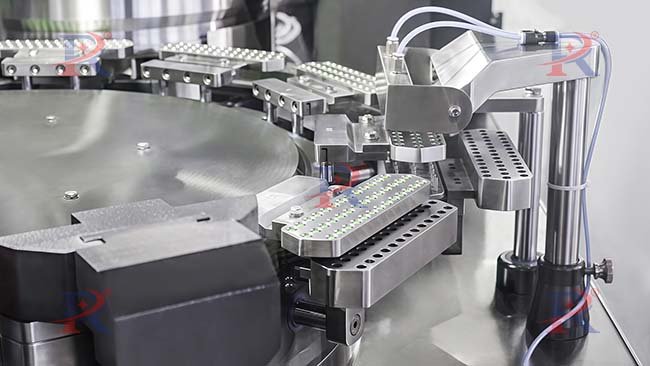
เพื่อรักษาเสถียรภาพที่ความเร็วดังกล่าว วิศวกรรมที่แม่นยำเป็นสิ่งสำคัญยิ่ง Ruidapacking ใช้ ระบบแคมที่ผลิตด้วยเครื่องจักร CNC และ หัวจับแบบอินเด็กซ์ Zeiss เพื่อการควบคุมการเคลื่อนไหวอย่างไร้ที่ติ สิ่งเหล่านี้รับประกันการไม่มีแรงย้อนกลับ การสั่นสะเทือนน้อยที่สุด และการจัดตำแหน่งแคปซูลที่แม่นยำ.
นอกเหนือจากความรวดเร็วแล้ว การออกแบบหลายสถานีช่วยเพิ่มประสิทธิภาพ อายุการใช้งานทางกล. แรงบิดที่สมดุลและการหมุนที่ได้รับการปรับให้เหมาะสมช่วยลดการสึกหรอของชิ้นส่วนที่เคลื่อนไหว ลดความถี่ในการบำรุงรักษา.
ผลลัพธ์ด้านประสิทธิภาพ: เพิ่มกำลังการผลิตต่อชั่วโมงโดยไม่ลดทอนความแม่นยำหรือเสถียรภาพ—เหมาะอย่างยิ่งสำหรับการขยายกำลังการผลิตและรองรับความต้องการปริมาณสูง.
4. การผสานรวมกับสายการนับ, การบรรจุขวด, และการตรวจสอบ
ประสิทธิภาพเพิ่มขึ้นหลายเท่าเมื่อเครื่องแคปซูลทำงานเป็นส่วนหนึ่งของสายการผลิตแบบบูรณาการ การเชื่อมโยง เครื่องบรรจุแคปซูล ด้วยเครื่องนับ, เครื่องปิดฝา, เครื่องซีลเหนี่ยวนำ, และเครื่องติดฉลาก สร้างระบบนิเวศการผลิตที่ไร้รอยต่อ.
การผสานรวมนี้ช่วยขจัดความจำเป็นในการถ่ายโอนด้วยมือ ลดความเสี่ยงของการปนเปื้อน และซิงโครไนซ์ข้อมูลระหว่างเครื่องจักร ผลลัพธ์คือสายการผลิตที่เชื่อมต่ออย่างสมบูรณ์ซึ่งสามารถติดตามการไหลของผลิตภัณฑ์ได้แบบเรียลไทม์.
การใช้การสื่อสารระหว่าง PLC และระบบการบริหารการผลิต (MES) ผู้ปฏิบัติงานสามารถตรวจสอบประสิทธิภาพโดยรวมของเครื่องจักร (OEE) เวลาในการผลิตต่อรอบ และการติดตามย้อนกลับของชุดการผลิตได้ ตัวอย่างเช่น สายการผลิตแคปซูลที่ป้อนเข้าสู่โดยตรง ระบบนับและบรรจุแคปซูล สามารถลดระยะเวลาวงจรการผลิตทั้งหมดได้ 30–40%.
นอกจากนี้ สถานีคัดแยกแบบบูรณาการสามารถตรวจจับแคปซูลที่บรรจุไม่เต็มหรือมีข้อบกพร่องได้โดยอัตโนมัติ และกำจัดออกก่อนเข้าสู่กระบวนการบรรจุหีบห่อ เพื่อรับรองคุณภาพโดยไม่ทำให้การผลิตล่าช้า.
ผลลัพธ์ด้านประสิทธิภาพ: ระบบอัตโนมัติที่เชื่อมต่อกันช่วยลดการจัดการโดยมนุษย์ ลดเวลาหยุดทำงานให้น้อยที่สุด และช่วยให้สามารถตรวจสอบย้อนกลับได้อย่างสมบูรณ์ ซึ่งเป็นปัจจัยสำคัญสำหรับการปฏิบัติตามมาตรฐาน GMP และการผลิตแบบลีน.
5. ระบบควบคุมอัจฉริยะและการบำรุงรักษาเชิงคาดการณ์
ประสิทธิภาพการผลิตสมัยใหม่ไม่ได้ขึ้นอยู่กับแค่ความเร็วเท่านั้น แต่ยังรวมถึงระยะเวลาการทำงานอย่างต่อเนื่องด้วย ระบบควบคุมอัจฉริยะเปลี่ยนแคปซูลอัตโนมัติ แคปซูลไลเซอร์ สู่เครื่องจักรที่ชาญฉลาดและเรียนรู้ได้ด้วยตนเอง.
เครื่องบรรจุแคปซูลของ Ruidapacking ประกอบด้วย ระบบ PLC+HMI แบบบูรณาการ ที่เก็บข้อมูลการสั่นสะเทือนและความดันอย่างต่อเนื่อง โดยการวิเคราะห์รูปแบบเหล่านี้ ซอฟต์แวร์การบำรุงรักษาเชิงพยากรณ์สามารถระบุตัวบ่งชี้เบื้องต้นของการสึกหรอหรือความไม่สมดุลได้.
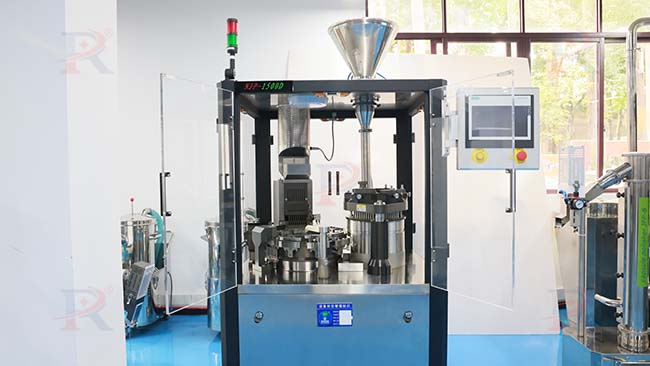
หากความดันสุญญากาศลดลงหรือมอเตอร์ทำงานเกินขีดจำกัดที่ปลอดภัย ระบบจะส่งการแจ้งเตือนก่อนที่ความเสียหายจะเกิดขึ้น ผู้ปฏิบัติงานสามารถวางแผนการบำรุงรักษาล่วงหน้าได้ แทนที่จะต้องตอบสนองต่อความขัดข้องที่ไม่คาดคิด.
สิ่งนี้ไม่เพียงแต่ช่วยลดเวลาหยุดทำงานที่ไม่คาดคิดซึ่งมีค่าใช้จ่ายสูงเท่านั้น แต่ยังช่วยยืดอายุการใช้งานของชิ้นส่วนต่างๆ อีกด้วย ข้อมูลภายในของ Ruidapacking แสดงให้เห็นว่าเครื่องจักรที่ติดตั้งระบบตรวจสอบเชิงคาดการณ์สามารถทำงานได้ 981TP3 ชั่วโมง เมื่อเทียบกับ 901TP3 ชั่วโมงสำหรับระบบเดิม.
ผลลัพธ์ด้านประสิทธิภาพ: เวลาหยุดทำงานน้อยลง, ค่าใช้จ่ายในการบำรุงรักษาลดลง, และการดำเนินงานระยะยาวที่ราบรื่นขึ้น.
6. การออกแบบที่ประหยัดพลังงานและเป็นไปตามมาตรฐาน GMP
การใช้พลังงานมักถูกมองข้ามในการอภิปรายเกี่ยวกับประสิทธิภาพ อย่างไรก็ตาม เครื่องบรรจุแคปซูลสมัยใหม่ได้รับการออกแบบมาเพื่อเพิ่มประสิทธิภาพการใช้พลังงานให้สูงสุดในขณะที่ยังคงมาตรฐานสุขอนามัย GMP และ FDA อย่างเคร่งครัด.
ทุกรุ่นของ Ruidapacking มาพร้อมกับตัวเครื่องที่ทำจากสแตนเลสสตีลเต็มรูปแบบ (304 และ 316L) และผิวเรียบไม่มีรอยต่อที่ช่วยป้องกันการสะสมของคราบสกปรก. ระบบเปลี่ยนเครื่องมืออย่างรวดเร็วและชิ้นส่วนประกอบแบบโมดูลาร์ช่วยให้การทำความสะอาดและการเปลี่ยนชุดการผลิตเป็นไปอย่างง่ายดาย.
ระบบขับเคลื่อนเซอร์โวใช้พลังงานน้อยกว่า 15–20% เมื่อเทียบกับมอเตอร์แบบดั้งเดิม ในขณะที่ยังคงรักษาแรงบิดและการเร่งที่เสถียร นอกจากนี้ ระบบหล่อลื่นอัตโนมัติยังช่วยลดการสูญเสียจากแรงเสียดทานให้น้อยที่สุด.
คุณสมบัติเหล่านี้รวมกันเพื่อลดเวลาในการเปลี่ยนผลิตภัณฑ์ ผู้ผลิตสามารถผลิตได้หลายชุดต่อวันและเปลี่ยนสูตรได้อย่างรวดเร็ว ซึ่งสอดคล้องกับวงจรตลาดที่รวดเร็วในอุตสาหกรรมผลิตภัณฑ์เสริมอาหาร.
ผลลัพธ์ด้านประสิทธิภาพ: ต้นทุนการดำเนินงานที่ต่ำลง วงจรการทำความสะอาดที่รวดเร็วขึ้น และการปฏิบัติตามมาตรฐาน GMP ระดับสากล.
7. กรณีศึกษาจริง: จากกึ่งอัตโนมัติสู่ระบบอัตโนมัติเต็มรูปแบบ
ผู้ผลิตผลิตภัณฑ์เสริมอาหารที่มีฐานในสหรัฐอเมริกาได้ร่วมมือกับ รุยด้าแพ็คกิ้ง เพื่ออัพเกรดสายการผลิตแคปซูลกึ่งอัตโนมัติให้เป็นระบบ NJP-2600D อัตโนมัติเต็มรูปแบบ.
ก่อน:
- ผลผลิต: 20,000 แคปซูล/ชั่วโมง
- ต้องการพนักงาน 2 คน
- เวลาหยุดทำงานบ่อยครั้งเพื่อการทำความสะอาดและเติมผง
- การสูญเสียผง 5% ต่อชุด
หลังจาก:
- ผลผลิต: 90,000 แคปซูล/ชั่วโมง
- 1 ผู้ปฏิบัติงาน
- เวลาหยุดทำงานลดลง 70%
- ของเสียจากวัสดุลดลงเหลือ 1.5%
การเปลี่ยนแปลงนี้ส่งผลให้ประสิทธิภาพการผลิตเพิ่มขึ้น รวมถึงการตอบสนองต่อตลาดได้ดีขึ้น ด้วยการเพิ่มกำลังการผลิตเป็นสองเท่าต่อวัน บริษัทสามารถลดระยะเวลาการส่งมอบ ชนะการสั่งซื้อที่ใหญ่ขึ้น และเพิ่มความไว้วางใจจากลูกค้า.
ผลลัพธ์ด้านประสิทธิภาพ: ข้อมูลจากโลกจริงยืนยันว่าระบบอัตโนมัติให้ผลตอบแทนจากการลงทุนที่วัดได้ผ่านผลผลิตที่สูงขึ้น การสูญเสียที่น้อยลง และการพึ่งพาแรงงานที่ลดลง.
8. การปฏิบัติตามข้อกำหนดและการตรวจสอบความถูกต้องในการผลิตยาในระดับโลก
ในตลาดที่มีการกำกับดูแลอย่างเข้มงวด เช่น สหรัฐอเมริกาและสหภาพยุโรป การปฏิบัติตามข้อกำหนดเป็นเงื่อนไขเบื้องต้นสำหรับการเพิ่มประสิทธิภาพอย่างมีนัยสำคัญ เครื่องบรรจุแคปซูลยาต้องผ่านมาตรฐาน CE, cGMP และได้รับการรับรองจาก FDA.
เครื่องบรรจุหีบห่อ Ruidapacking ผลิตขึ้นภายใต้มาตรฐาน ISO9001 พร้อมชุดเอกสารประกอบครบถ้วน รวมถึงโปรโตคอลการตรวจสอบความถูกต้อง (IQ/OQ/PQ) และใบรับรองการตรวจสอบย้อนกลับของวัสดุ ซึ่งช่วยให้การตรวจสอบจากลูกค้าเป็นไปอย่างรวดเร็วและได้รับการอนุมัติจากหน่วยงานกำกับดูแลได้ง่ายขึ้น.
ตู้เก็บของที่เหมาะสำหรับห้องสะอาด, มอเตอร์เสียงต่ำ, และตัวกรองฝุ่นไอเสีย ช่วยรักษาสภาพแวดล้อมที่ควบคุมได้, ทำให้ทุกแคปซูลตรงตามมาตรฐานเภสัชตำรับ.
ผลลัพธ์ด้านประสิทธิภาพ: การผสานรวมการปฏิบัติตามข้อกำหนดช่วยลดความล่าช้าในการตรวจสอบและขจัดค่าใช้จ่ายในการตรวจสอบความถูกต้องซ้ำ—ทำให้กระบวนการปล่อยผลิตภัณฑ์เป็นไปอย่างราบรื่น.
9. แนวโน้มในอนาคต: การบรรจุแคปซูลอัจฉริยะ 4.0
รุ่นต่อไปของ เครื่องบรรจุแคปซูลอัตโนมัติ กำลังก้าวเข้าสู่ยุคอุตสาหกรรม 4.0 การผสานรวมของปัญญาประดิษฐ์ การเชื่อมต่อคลาวด์ และการวิเคราะห์ข้อมูลแบบเรียลไทม์ กำลังจะเปิดศักราชใหม่แห่งการผลิตแคปซูลอัจฉริยะ.
รุ่นในอนาคตจะใช้ 알고ริทึมการเรียนรู้ของเครื่องเพื่อปรับค่าความดันการจ่ายและพารามิเตอร์สุญญากาศโดยอัตโนมัติตามลักษณะของผง การวินิจฉัยระยะไกลจะช่วยให้วิศวกรสามารถตรวจสอบประสิทธิภาพของอุปกรณ์ได้จากทุกที่ ซึ่งจะช่วยปรับปรุงเวลาการตอบสนองในการให้บริการ.
ข้อมูลที่รวบรวมจากหลายพันรอบการผลิตสามารถเปิดเผยจุดคอขวดด้านประสิทธิภาพ ทำให้สามารถปรับปรุงอย่างต่อเนื่องได้.
ผลลัพธ์ด้านประสิทธิภาพ: การเปลี่ยนแปลงทางดิจิทัลขับเคลื่อนการเพิ่มประสิทธิภาพเชิงคาดการณ์ ช่วยให้การผลิตมีความสม่ำเสมอโดยมีการควบคุมด้วยมือเพียงเล็กน้อย.
บทสรุป
กระบวนการบรรจุแคปซูลอาจดูเรียบง่าย แต่เบื้องหลังแคปซูลแต่ละเม็ดนั้นซ่อนความซับซ้อนทางวิศวกรรม การควบคุมที่แม่นยำ และนวัตกรรมระบบอัตโนมัติไว้มากมาย เครื่องบรรจุแคปซูลอัตโนมัติในปัจจุบันได้ผสานองค์ประกอบเหล่านี้เข้าด้วยกันบนแพลตฟอร์มเดียวที่มีประสิทธิภาพ มอบทั้งความเร็ว ความแม่นยำ ความสอดคล้องตามมาตรฐาน และความน่าเชื่อถือ.
ในตลาดที่ความต้องการและการแข่งขันยังคงเพิ่มขึ้นอย่างต่อเนื่อง การอัปเกรดสู่โซลูชันการบรรจุแคปซูลประสิทธิภาพสูงไม่ใช่ความฟุ่มเฟือย—แต่เป็นความจำเป็นสำหรับการเติบโตอย่างยั่งยืน.
👉 หากต้องการเรียนรู้เพิ่มเติมเกี่ยวกับเครื่องบรรจุแคปซูลอัตโนมัติของ Ruidapacking กรุณาเยี่ยมชม ruidapacking.com สำหรับการปรึกษาผู้เชี่ยวชาญ.
คำถามที่พบบ่อย – เครื่องบรรจุแคปซูล
Q1: ความแตกต่างที่สำคัญระหว่างเครื่องบรรจุแคปซูลแบบกึ่งอัตโนมัติและแบบอัตโนมัติคืออะไร?
A: เครื่องกึ่งอัตโนมัติต้องเคลื่อนย้ายแผ่นแคปซูลด้วยมือระหว่างแต่ละขั้นตอน ในขณะที่รุ่นอัตโนมัติจะทำการป้อน แยก เติม และล็อคแคปซูลอย่างต่อเนื่อง ช่วยเพิ่มประสิทธิภาพและแม่นยำในการผลิตอย่างมาก.
คำถามที่ 2: เครื่องจักรผลิตแคปซูลสมัยใหม่มีความแม่นยำเพียงใด?
A: รุ่นอัตโนมัติระดับสูงส่วนใหญ่มีความแม่นยำในการจ่าย ±1–2% ซึ่งช่วยให้มั่นใจในน้ำหนักที่สม่ำเสมอและลดการสูญเสียผงให้น้อยที่สุด.
คำถามที่ 3: มีตารางการบำรุงรักษาใดที่แนะนำเพื่อประสิทธิภาพสูงสุด?
A: การทำความสะอาดตามปกติหลังการทำงานแต่ละกะ และการบำรุงรักษาเชิงป้องกันทุก 500–800 ชั่วโมง จะช่วยให้เครื่องจักรทำงานได้อย่างเต็มประสิทธิภาพและป้องกันการหยุดทำงานที่ไม่คาดคิด.
คำถามที่ 4: เครื่องผลิตแคปซูลสามารถรองรับวัสดุแคปซูลที่แตกต่างกันได้หรือไม่?
A: ใช่ เครื่องจักรสามารถประมวลผลทั้งแคปซูลเจลาตินและแคปซูล HPMC ได้.
คำถามที่ 5: เครื่องบรรจุแคปซูลอัตโนมัติเหมาะสำหรับผงอาหารเสริมหรือไม่?
A: แน่นอน. พวกเขาถูกใช้กันอย่างแพร่หลายสำหรับสารสกัดจากสมุนไพร, วิตามิน, และส่วนผสมของโปรตีน, ให้ผลลัพธ์ที่เสถียรแม้สำหรับวัสดุที่ท้าทาย.
คำถามที่ 6: Ruidapการขาด’เครื่องจักรของเราเปรียบเทียบกับซัพพลายเออร์รายอื่นอย่างไร?
A: Ruidapacking มอบข้อได้เปรียบทางการแข่งขันในด้านการกลึงความแม่นยำสูง การออกแบบหลายสถานี และระบบแบบโมดูลาร์เต็มรูปแบบ—ซึ่งผสมผสานความเร็ว ความน่าเชื่อถือ และความคุ้มค่าด้านต้นทุนได้อย่างลงตัว.
